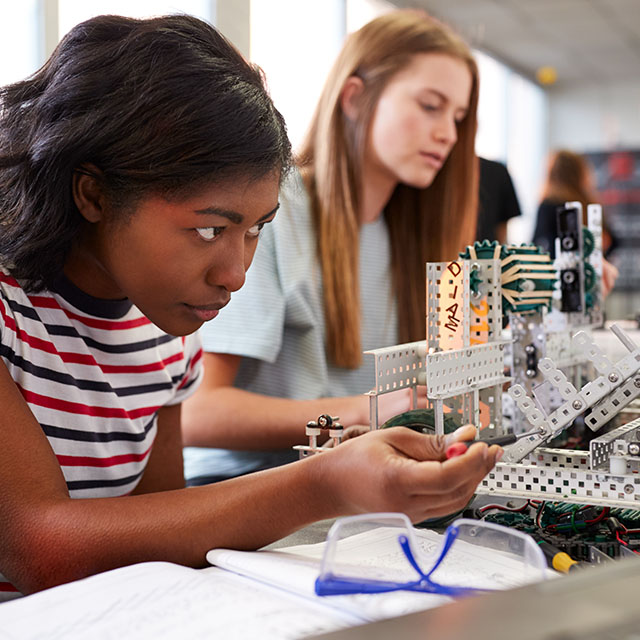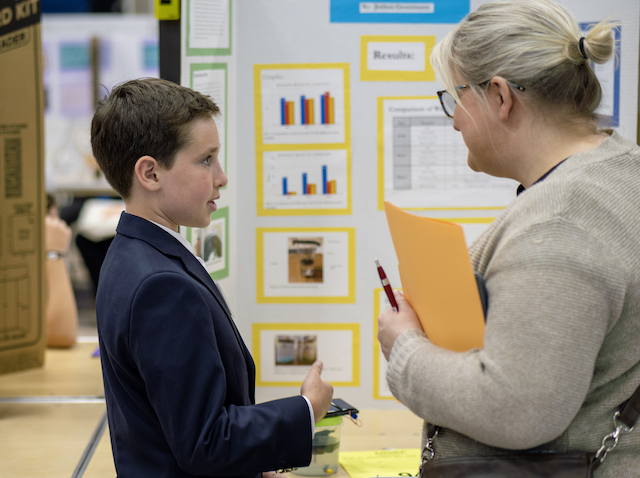High School Fairs
Rules & Guidelines
Review the 2024-25 MSEF High School Manual for requirements, regulations and expectations for the fair.
- Click any part of the Table of Contents to jump to the section you need.
- Use the ‘search’ or ‘find’ function to search the PDF for any keywords or vocabulary.
Print out or ‘Make a Copy’ of the Science Fair Checklist to keep track of your progress.
Research Plan Templates (please make a copy to edit)
Template: Standard
Template: Engineering
Template: Engineering with Humans
Template: Human Subjects
Template: PHBA – Biological Agents
Template: Vertebrate Animals
High School Students interested in starting research over the summer should review this Student Newsletter to avoid disqualification. Email [email protected] with questions.

Project Requirements:
Please see manual for more details
1.
A project may include no more than 12 months of continuous research and may not include research performed before January of the year prior to the fair. Projects that build on or progress from previous years work are called ‘continuation projects’ and must demonstrate a substantive difference in focus and methodology.
2.
Individual projects must be entirely the work of the individual student and team projects (up to 3) must be entirely the work of the team. Project ideas should be developed by students and not assigned. Please review the Ethics Statement for more information about the role of mentors in supporting student work.
3.
Required forms must be submitted to the Massachusetts Statewide Scientific Review Committee for approval BEFORE starting experimentation for restricted areas of research and before participating in the Fairs for all project. Use the templates above to create a thorough research plan for review. More information on paperwork and approval requirements can be found here in the Project Approval Decision Guide.
4.
There are five primary components to a Science & Engineering Fair project: (1) a submitted research plan, (2) a project notebook to record each step of the project – handwritten preferred. (3) A lab report or research paper, complete with works cited and an abstract. (4) A visual display for presentation at the Fair. Consult the manual for restrictions on materials for the Fair presentation and venue. (5) An oral presentation about the project. More information and recommendations can be found here.
5.
Students must work with qualified adults as outlined in the High School Manual. This includes a teacher and an ‘adult sponsor’ for the project, which may be the same person. Some projects may also require a ‘qualified scientist’ or ‘designated supervisor.’ Adults help students acquire background information, teach the techniques required, and to monitor for safety. Teachers are also responsible for communication with the Regional Fairs and MSEF about participation. Review the Manual section on ‘Roles and Responsibilities of Students and Adults’ (page 8)
6.
Projects should show evidence of scientific research, engineering design, computer science, or applied mathematics. More information on project methods can be found here. Projects that are demonstrations, ‘library’ research or informational projects, ‘explanation’ models, or kit building are not appropriate for competition in MSEF.
The Judging Experience
Judges (professionals and academics in STEM) volunteer their time to review student projects. Judge scores are based on a student’s understanding of their project, not it’s sophistication. Review the Judges Rubric with your students to help them prepare for the experience. The judge rubric is new for the 2024 High School Fairs.

Frequently Asked Questions
-
What is pre-approval?
All projects must be approved by the teacher and/or adult sponsor before experimentation. Students who engage in research in the following categories MUST also get prior approval BEFORE starting experimentation from the Statewide High School Scientific Review Committee (SRC).
- Human participants/subjects
- Hazardous or toxic chemicals or activities
- Vertebrate Animal projects
- Potentially hazardous biological agents
- Research performed in an industrial/institutional setting
-
What are the forms I may need to submit for review and approval?
The following forms are required. MSEF uses the same forms as ISEF so you can preview them here. Once you have a research plan, you can create an account to upload your forms at mahs.zfairs.com
ALL PROJECTS:
These forms are included in the Paperwork Package you will download from MAHS.zfairs.com
- Checklist for Adult Sponsor (1),
- Student Checklist (1A) Research Plan/ Project Summary,
- Approval Form (1B) and MSEF permissions
- Risk Assessment (3), recommended for all projects
IF NEEDED, PRE-APPROVAL IS REQUIRED
- Risk Assessment (3), required for some projects
- Qualified Scientist Form (2), when applicable
- Human Subjects (4), when applicable, must be printed, signed, and uploaded
- Vertebrate Animal (5A, 5B), when applicable
- PHBA Risk Assessment Form (6A), when applicable
- Human and Vertebrate Animal Tissue Form (6B), for all studies involving tissues and body fluids
MAY BE NEEDED AT CONCLUSION OF PROJECT
- Regulated Research Institution Form (1C), when applicable
- Continuation Form (7), for projects that build on earlier projects
-
What is a continuation project and should I have a form 7?
For students who have participated in a project in past years, please consider if you need form 7 completed. It’s full title is “Continuation/Research Progression Project”. Sometimes this form is needed even if this year’s project is distinct from last years. This form is designed to clearly outline those differences.
- Any project based on the student’s prior research could be considered a continuation/research progression project. These projects must document that the additional research is a substantive expansion from prior work (e.g., testing a new variable or new line of investigation). Repetition of previous experimentation with the same methodology and research question, even with an increased sample size, is an example of an unacceptable continuation.
A continuation project shows that you have progressed forward with your research, which is a valuable experience in STEM.
-
What are the pathways to MSEF?
The two pathways for student participation at the State Fair: Regional Fair Promotion and Direct Entry
All student projects must go through the Statewide SRC approval system (https://mahs.zfairs.com/) before the regional fair is held to participate in either pathway.
- Regional Fair Promotion: Through competition at a Regional Fair, top scoring projects are awarded eligibility to enter the statewide Massachusetts Science & Engineering Fair (MSEF) as well as the International Science and Engineering Fair (ISEF)
-
- This is the primary pathway for State Fair participation. Through the Regional Science Fairs, students have the advantage of gaining feedback from expert judges on how to improve their projects and presentation, enabling students to refine their work before the statewide Science Fair.
- If you become a delegate for ISEF at the Regional Fair, you must still attend MSEF.
- Students will be promoted to MSEF (https://msefhs.zfairs.com/) within 5 days of receiving the award at the regional fair.
- Direct Entry: In addition to projects awarded entry in the statewide fair, each school may send up to two additional student projects (either individual or team projects).
-
- To qualify for direct entry, a student must already have their project approved by the Statewide SRC before the regional fair is held. This includes any pre-approvals that were required BEFORE experimentation if the project involved any of the restricted areas of research. If these steps were not taken, the project is not eligible for statewide fair participation.
- Students must be signed up through their school to participate. Direct entry names/projects must be provided and confirmed by the school to MSEF at [email protected] within 5 school days after the date of your regional fair award ceremony. Review these dates at the regional zFairs site. Links can be found here.
-
What are the materials required to be judged at MSEF?
The following items are required for State Science & Engineering Fair participation:
-
- Display Board (free-standing)
- Final Project Report (also called Research Paper)
- Project Notebook – started at the beginning of your project
- Prepared Oral Presentation
- You should also have:
- Research Plan
- Project Abstract
- Approvals on required forms
Review this slideshow for more details and resources.
Remember: All required elements have overlapping components so they are not 5 completely different efforts but different versions of how you tell your science fair story.
-
-
What are the components I should include on my display board?
Your presentation should tell the story of your project so that it explains your project and shows your understanding and interest in your work. This is a recommended format. Find more details in the Project Components Guide here.
- Intro
- Methods and Materials (with photos)
- Conclusion
- Background
- Results (with visuals)
- Bibliography/Works Cited
Some students may print out their display board professionally, this is not necessary. Printing out, cutting, and pasting the components of your poster board gives you more flexibility for placement and allows you to make small changes more easily.
-
What are the guidelines for a final Project Report?
There are several accepted formats for your final Project Report, also called a Research Paper or a Lab Report. This is one recommendation:
Science Research
- Table of Contents
- Background
- Hypothesis
- Methods and Materials
- Data Tables
- Discussion and Analysis
- Conclusions
- Works Cited
Engineering
- Table of Contents
- Background
- Statement of Purpose
- Methods and Materials
- Data or Results
- Discussion and Analysis
- Conclusion
- Works Cited
Judges often look for succinct and well structured reports that show evidence of scientific writing. Quality over quantity is important.
-
What are the guidelines for Lab Notebooks?
Your lab notebook should be worked on throughout the duration of your project. This is the ‘journal’ of your work. These handbooks have helpful sections for components of your project.
-
Can I update my project between the Regional and the State Fair?
You can update your project, but you cannot add any new procedures. You can repeat trials, but not try to test something in a new way. You must stay consistent with your research plan that was reviewed and approved by the SRC committees. Fixing up slides and graphs is fine and even encouraged!
You should not rename your project or change categories for judging after the Regional Fair.
You can explain to a judge changes you would make if given the opportunity. This will show that you have thought critically about your work and demonstrates learning.
-
What Rubrics are used to judge? (for reference only)
Click HERE for a combined rubric for Science, Engineering and Math Projects
The judging rubric was updated for the 2024 Fairs.
-
How do we avoid conflicts with SAT or AP exams?
MSEF realizes that there may be conflicts with the scheduling of SAT and AP exams and MSEF events, or ISEF if applicable. However, please note that science fair students have the option to schedule these exams without conflict. Please reach out to MSEF at [email protected] with questions.
-
Why are there two sets of safety guidelines?
One set of safety guidelines refers to the time during which you are doing your experiment. The other set of safety guidelines refers to what you can bring the day of the science fair as part of your project display. Some of the guidelines overlap, but there are differences, so be sure to look at both sets. Consult the manual for more information. On the day of the science fair, there will be safety checks of all projects before the judging takes place.
-
What is ISEF?
ISEF, (International Science and Engineering Fair) is a national competition for top high school winners from the Regional Fairs. MSEF informs students of their selection and provides all necessary information for participation.
Please note: some MSEF rules and expectations vary. If you are competing at MSEF it is important to familiarize yourself with the state specific rules in the High School manual linked above.